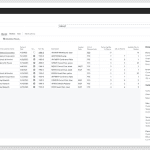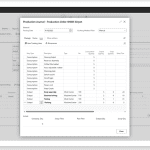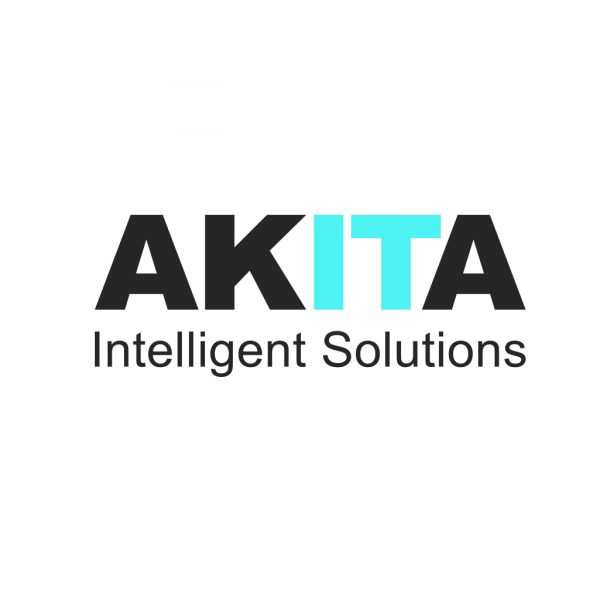
ERP Software Solutions For Manufacturing By Akita
Find out more about implementing an ERP solution for manufacturing
Delivering Transformative ERP Solutions For Manufacturing
Optimise production, reduce bottlenecks and achieve operational excellence across your production processes with a manufacturing-focused ERP solution.
As an experienced manufacturing ERP partner, Akita tailors applications to meet the unique requirements of producers and manufacturers spanning a broad range of requirements.
Whether a small-scale manufacturer looking to optimise your shop floor, or a large enterprise aiming to streamline your global operations, we can implement and support advanced manufacturing ERP and MRP solutions that drive improved operational efficiency and profitability.
Schedule a consultation to explore the potential of Dynamics 365 for manufacturing:
The Importance Of ERP Systems For Manufacturing Organisations
ERP systems have always been linked to manufacturing, ever since their inception in the pre-digital 1960s. Since this time, they’ve evolved to get ever closer to meeting the needs of manufacturers.
A key area where ERP systems excel is supply chain management. Providing real-time visibility into the supply chain, ERP systems help manufacturers track inventory levels, manage supplier relationships, and ensure timely delivery of raw materials. This improved oversight reduces delays and disruptions, ensuring a smoother production process.
In production planning, ERP systems enable manufacturers to create efficient production schedules, allocate resources effectively, and monitor production progress. This level of control and planning helps minimise downtime, optimise machine and resource utilisation, and ensure that production targets are met.
Quality control is another critical area where ERP systems make a significant impact. By integrating quality management processes within the ERP system, manufacturers can enforce quality standards, track defects, and implement corrective actions promptly. This integration ensures that products meet the required specifications and reduces the risk of quality issues.

Automation, Productivity & Cost-savings
One of the primary advantages is increased efficiency. ERP systems for manufacturing automate routine tasks, streamline processes, and provide real-time data access, enabling faster decision-making and reducing manual errors. This efficiency leads to faster production cycles and the ability to respond swiftly to market demands.
ERP systems also help in reducing costs. By optimising inventory levels, improving resource allocation, and minimising waste, manufacturing ERP systems cut operational expenses. Additionally, the ability to forecast demand accurately and plan production accordingly helps avoid overproduction and excess inventory costs.
Improved product quality is another major benefit of ERP integration. With robust quality control measures and real-time monitoring, manufacturers can maintain high standards and ensure consistent product quality. This not only enhances customer satisfaction but also reduces returns and rework costs.

Why Choose Akita For Your Manufacturing ERP Needs?
Akita is an expert ERP partner, with specialist experience in delivering Microsoft ERP solutions for manufacturing.
With our focus on delivering customised solutions, we can configure Manufacturing modules to perfectly align with your unique business needs, enabling you to unlock their full potential.
Our ERP consultants understand the complexities involved in managing production, inventory, and supply chain activities, and provide solutions that enhance efficiency, reduce costs, and accelerate growth.
And they have the capabilities to expand ERP solutions to meet new business and production requirements, such as just-in-time manufacturing.
Whether involved in discrete manufacturing, process manufacturing, or a combination of both, our team of skilled consultants and developers can guide you through every step of the manufacturing ERP implementation process.
Akita’s ERP Solution Features For Manufacturing
Microsoft ERP solutions offers an advanced range of MRP features and tools:
Production Planning: Create and manage production orders within Business Central with tools for planning and scheduling. Define routings, calculate material requirements, and optimise production schedules.
Bill of Materials (BOM) Management: Define and maintain detailed BOMs with multiple levels and versioning to keep track of changes/updates.
Quality Control: Define quality criteria, perform inspections, and record quality results. Ensure that products meet specified standards and track quality issues and non-conformances.
Resource Planning: Manage manufacturing resources such as machinery, equipment, and labour. Define and allocate resources to production orders, track resource usage, and optimise resource utilisation.
Demand Forecasting: Microsoft’s ERP solutions offers forecasting tools that use historical data, sales trends, and other factors to predict future demand.
Capacity Planning: In-built tools to define and manage capacities for work centres and machines. It allows you to schedule operations based on available capacity and identify bottlenecks or underutilised resources.
Shop Floor Control: Manage shop floor operations by enabling operators to record time, material consumption, and quantities produced. Can be integrated with wider shop floor terminals, barcode scanning, and IoT devices.
Costing & Financial Management: Integrates with Business Central’s financial management capabilities and wider finance systems, enabling better cost accounting and budgeting. Track manufacturing costs, calculate product costs, and analyse profitability.
Inventory Management: The solution provides comprehensive inventory management capabilities, including tracking and control of raw materials, work-in-progress (WIP), and finished goods. It supports inventory valuation methods, and reordering point calculations, and provides real-time visibility into inventory levels.
Implementing ERP Systems For Manufacturing
We follow a meticulous, collaborative approach to implementing ERP systems for our manufacturing customers. We ensure a seamless transition while minimising operational disruption – below is a step-by-step guide to our implementation process:
Success Stories: Transforming Manufacturing With Akita’s ERP Solutions

Business Central ERP Integration For Vehicle Safety Manufacturer
We supported a global manufacturer of vehicle safety equipment with sales CRM system deployment and ERP integration. Find out about how our Microsoft Dynamics 365 Business Central Implementation tightened operations for this international manufacturing company, giving them more accurate tracking of data and revenue information.

Dynamics 365 Sales Solution For Manufacturing Company
We created a custom Microsoft Dynamics 365 sales solution designed to increase the efficiency of a sales team and streamline the company's ordering and invoicing process. Find out more about how our implementation allowed them to automate and simplify areas of their quoting processes, permitting the sales team to have a higher volume of sales interactions and in turn secure more customers.

SharePoint Project Management Solution For Furniture Manufacturer
We designed a modern SharePoint project document management solution for an industry-leading manufacturer of bespoke furniture. Find out more about how our SharePoint solution improved efficiency across the entire business and rectified their issues with authentication as well as the frustrating user experience they were dealing with previously.
Tailoring ERP To Fit Your Manufacturing Business
Tailoring an ERP system to fit the unique operational needs and challenges of a manufacturing business involves a detailed and collaborative process. At Akita, we begin with a comprehensive assessment of your existing processes, workflows, and pain points. This exploratory process looking into your operations helps us understand your specific requirements and identify areas where ERP integration can drive the most significant improvements.
We then configure the ERP system to align with your business’s unique needs, ensuring that it supports and enhances your manufacturing processes. This includes customising modules for supply chain management, production planning, inventory control, quality assurance, and more.
We customise and optimise ERP solutions for unique manufacturing processes such as:
Supply Chain Management: For a manufacturer struggling with supply chain inefficiencies, we customise their ERP system to provide real-time tracking and management of inventory levels, supplier performance, and delivery schedules. This customisation helps to minimise delays and reduce costs associated with overstocking or stockouts.
Production Planning: Where production scheduling is a challenge, we tailor their ERP system to create dynamic production schedules that optimise resource allocation and machine utilisation. This ensures that production targets are met efficiently, reducing downtime, and increasing throughout.

Quality Control: If maintaining product quality is a priority, we integrate robust quality management processes within their ERP system. This includes setting up automated quality checks, tracking defects, and implementing corrective actions promptly. This customisation helps ensure that products meet the required specifications and reduces the risk of quality-related issues.
Inventory Management: For a manufacturer dealing with inventory management issues, we configure their ERP system to provide accurate, real-time data on inventory levels. This helps in optimising stock levels, reducing carrying costs, and improving order fulfilment rates.
Data Analytics And Reporting: To support strategic decision-making, we customise ERP systems to generate detailed reports and analytics. These insights help in identifying trends, forecasting demand, and making informed business decisions that drive growth and profitability.
Book A Demo
Continuous Support And Evolution
Our commitment to your success extends well beyond the initial ERP implementation. We provide ongoing support and maintenance services to ensure that your ERP system remains efficient, reliable, and up-to-date. Our dedicated support team is always available to address any issues, provide system updates, and offer performance optimisations, ensuring your ERP system runs smoothly at all times.
As your organisation grows and industry standards evolve, Akita works closely with you to adapt and enhance your ERP system. We regularly review your system’s performance and capabilities, making necessary adjustments and upgrades to meet new business requirements and leverage the latest technological advancements. This proactive approach ensures that your ERP system continues to support your strategic goals and drives long-term success.
ERP Systems For The Manufacturing Industry FAQ
What is the typical timeline for implementing an ERP system in a manufacturing business?
The timeline for implementing an ERP system can vary depending on the complexity and size of the business. Generally, it can take anywhere from a few months to over a year. The process involves stages such as initial consultation, planning, data migration, system configuration, testing, training, and go-live support.
How does an ERP system help with regulatory compliance in manufacturing?
ERP systems help manufacturing businesses maintain regulatory compliance by providing tools for tracking and documenting compliance-related activities. These systems offer audit trails, ensure accurate reporting, and maintain records that meet industry regulations and standards, reducing the risk of non-compliance penalties.
Can an ERP system integrate with existing manufacturing software?
Yes, modern ERP systems are designed to integrate with a wide range of existing software applications used in manufacturing. This includes systems for inventory management, production planning, quality control, and supply chain management, ensuring seamless data flow and unified operations.
How do ERP systems support lean manufacturing principles?
ERP systems support lean manufacturing by streamlining processes, reducing waste, and improving efficiency. They provide real-time data and analytics, enabling better resource allocation, inventory management, and production planning, all of which are critical components of lean manufacturing.
What kind of scalability do ERP systems offer for growing manufacturing businesses?
ERP systems are highly scalable, allowing businesses to start with core functionalities and add more advanced features as they grow. This scalability ensures that the ERP system can adapt to increasing production demands, additional users, and expanded operational requirements without needing a complete system overhaul.
How do ERP systems enhance customer satisfaction in manufacturing?
ERP systems enhance customer satisfaction by improving order accuracy, reducing lead times, and ensuring on-time delivery. Real-time tracking of orders, inventory levels, and production schedules enables manufacturers to meet customer demands more effectively and maintain high service levels.
What role do ERP systems play in managing manufacturing costs?
ERP systems play a crucial role in managing manufacturing costs by providing detailed insights into various cost factors, such as raw materials, labour, and overhead. They help identify cost-saving opportunities, optimise resource utilisation, and improve budgeting and forecasting accuracy, leading to more efficient cost management.

Drive Your Manufacturing Success with Akita
To discuss a manufacturing ERP project with a consultant, contact us:
Call us on: 0330 135 8042
Email us on: info@akitais.com
Or alternatively complete our contact form below and one of our specialists will be in touch:








